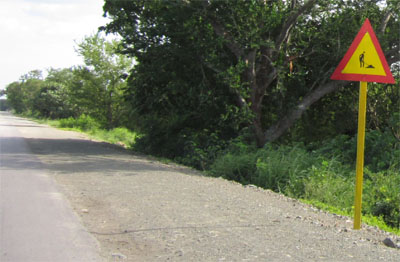
We’re already used to perceiving the interrogation tactic of “good cop, bad cop,” so it’s only natural that those of us who are usually on the other side of the questioning think of duplicating the method.
On October 4 at around 5:30 in the afternoon an impressive police operation stopped us at the entrance to the city of Bayamo to prevent us from attending the trial of Angel Carromero. Yoani Sanchez, Agustin Lopez and I had crossed the 500 miles that separated us from Havana in a Moskovich make car. We suspected they wouldn’t let us enter the courtroom, but we didn’t think we merited the deployment of forces with which they intercepted us.
Yoani and Agustin have already told their stories. Yoani chose to clam up like an oyster, neither responding to questions nor taking food or water. She was the bad prisoner, impenetrable. I chose instead to respond, to drink fluids and, although I wasn’t on a hunger strike, I refused food (white rice and a chicken leg) simply because I had no appetite.
An investigating officer who introduced himself as Captain Céspedes (What a coincidence, a Céspedes in Bayamo!) let me know that I was under investigation for the presumed crime of “defamation of the heroes and martyrs of the Revolution,” which I later learned is really called “Defamation of institutions and organizations and of heroes and martyrs,” as defined in Article 204 of the Penal code.
I will not relate here all the dialog verbatim, just my impressions. The most notable was that, according to what my interrogator hinted at, his opinions about us were not based on information provided as evidence, nor on the reports of experts, but by what he had learned through “enemy propaganda” that had been divulged in the official Cuban media. Full of good faith as I am, I suppose that this officer, a serious, respectful and meticulous man, could not reveal the real results of the investigations because if he had we could not have been processed.
Another interesting detail is that when I was explaining the reason for our presence in Bayamo I told the investigator that the newspaper Granma (which never lies?) had published that the trial would be oral and public, so we had the right as citizens to attend. Cespedes responded that this did not include counterrevolutionaries. I couldn’t resist the temptation and argued that when Cuban decriminalizes political dissent it would not be possible to stop a citizen from attending a trial previously announced as oral and public.
With the firmness that is used to state one’s deepest convictions, my interlocutor warned me as follows: “We will never permit the counterrevolution to do what it wants.” In my role as the good prisoner I clarified that luckily it would not be them who would be governing the country and that the day this decision happened he would have to obey the order, as befits a soldier.
Then he let me sleep on a single bed with a foam mattress in a room with air conditioning and at noon on the 5th we returned to the capital in a minibus that traveled escorted by police cars sounding their sirens from Bayamo all the way to Guanabacoa.
Arriving in front of the building where we live, Yoani, the bad prisoner, shot out like greased lightning and went up the elevator. Once in the lobby, after returning to me my confiscated belonging, I said goodbye to the other officer who came to the front of the caravan. “I’m sorry I cannot thank you,” I said, “we would have preferred to return another way and you have hindered us.”
The Moskovich made another journey, but that is related by Dekaisone.
8 October 2012
